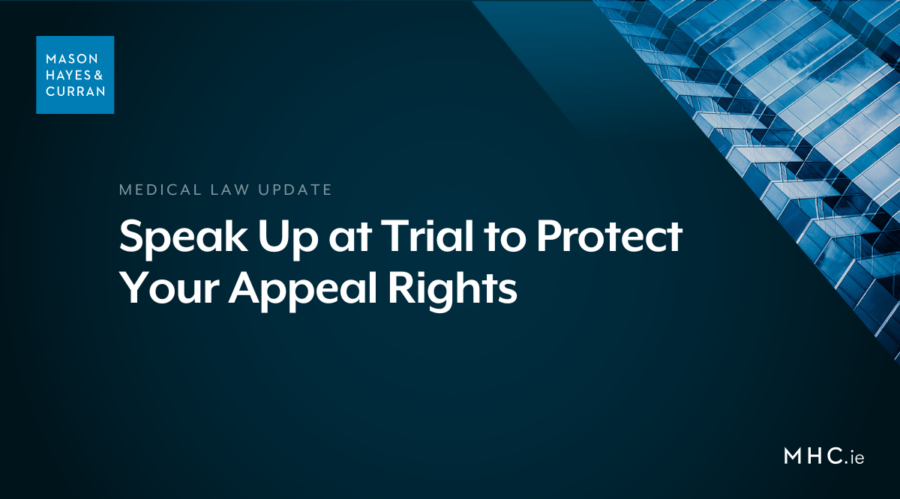Speak Up at Trial to Protect Your Appeal Rights

The Court of Appeal dismissed the appeal of patient Caitriona Crumlish against a High Court decision in favour of Letterkenny University Hospital. Our Medical Law team looks at why the Court of Appeal decision provides helpful takeaways for legal practitioners on when to make procedural complaints during a trial, and on the Court’s consideration of expert evidence.
The Court of Appeal dismissed the appeal of patient Caitriona Crumlish against a High Court decision in favour of Letterkenny University Hospital (the Hospital).[1] Mrs Crumlish alleged the Hospital failed to diagnose her breast cancer causing a five month delay in diagnosis. The Court of Appeal decision provides helpful insights for legal practitioners on when to make procedural complaints during a trial and on the Court’s consideration of expert evidence.
The High Court decision
The High Court claim[2] arose out of an alleged failure on the part of the Hospital to detect and diagnose Mrs Crumlish’s breast cancer when she attended a symptomatic breast clinic in May 2017. She was advised the lumps were cysts. Mrs Crumlish was not diagnosed until five months later at her second visit to the clinic in October 2017. While the High Court accepted the cancer was present in May 2017, Mrs Crumlish did not prove her cancer was detectable at that time, so the Court found there was no delay in diagnosis.
Notably, the High Court found Professor Bundred, consultant surgeon retained as an expert witness for Mrs Crumlish, was biased. Professor Bundred estimated the size of the cancer in May 2017 by unjustifiably selecting a 45 day period for the cancer to double in size. This would mean the tumour size would neatly match the May 2017 lump size. He did this based on a paper[3] which estimated that a tumour doubles between 44 and 147 days, but he did not include this range.
The Court decided that Mrs Crumlish did not prove that the lump detected in May 2017 was a cancer based on a 45 day tumour doubling time. It was more likely that the reporting radiologist’s report of the breast imaging in May 2017 was accurate and that a 12mm cyst caused the lump. As there was no delayed diagnosis, there was no need for the Court to determine whether Mrs Crumlish’s care at the Hospital was negligent or not.
We previously reported on and analysed the High Court decision here.
The Court of Appeal decision
Mrs Crumlish appealed the case on 68 grounds, which was strongly criticised by the Court of Appeal. The Court directed Mrs Crumlish to distil down the grounds of appeal, resulting in seven grounds. Notably, at the start of the trial Mrs Crumlish told the Court she was no longer relying on Professor Bundred’s expert evidence. In essence, she complained that:
- The Hospital’s defence of the claim was not properly or fairly conducted, and
- The judge had erred in her treatment of the expert evidence
The Hospital’s defence of the claim was not properly or fairly conducted:
- Mrs Crumlish claimed the Hospital’s real defence was that she developed an interval cancer and this was not pleaded by the Hospital.
- A surgeon at the clinic gave opinion evidence on radiological issues which was outside of the area he was supposed to comment on.
- The Hospital’s defence to the claim was not put to Mrs Crumlish on the stand.
- The Hospital’s true defence was not disclosed until the end of the trial when a defence expert, Professor Crown, gave evidence on the interval cancer.
The Court dismissed these grounds and made some observations on how these types of procedural complaints ought to be dealt with at trial:
- The Court found it was clear that the Hospital asserted that there was no detectable cancer on the first occasion in May 2017. So, the Hospital’s case could not be described as anything other than a plea of interval cancer, though not expressly called that in the pleadings.
- The Court said the credibility of a witness was a matter for the trial judge and that a Court of Appeal would rarely find that a trial judge erred in their assessment of a witness’s credibility.
- Regarding points 2, 3 and 4 above, the Court said the proper remedy is to raise these issues during trial.
- It would have been possible to apply for an adjournment to allow the Hospital to amend its Defence. Mrs Crumlish could have sought her costs on the basis the Hospital didn’t properly plead its case. This was not done so Mrs Crumlish cannot complain that unfairness arose which requires a retrial.
The judge erred in her treatment of the expert evidence:
The High Court judge dismissed the evidence of Mrs Crumlish’s expert Professor Bundred on tumour doubling time as being biased. On Appeal, Mrs Crumlish claimed the High Court ignored the other evidence from other experts on tumour doubling time. The trial judge had ruled that expert evidence from more than one expert in a particular field of expertise is inadmissible.
Usually, a party is only allowed to rely on one expert in a particular field of expertise to comment on a particular issue. Interestingly the Court of Appeal found that Mrs Crumlish was correct on this point and experts in different disciplines can comment on each other’s evidence as long as they are speaking on an issue within their own expertise. The Court of Appeal found the trial judge did consider all the relevant evidence in any event but preferred the Hospital’s evidence over that of Mrs Crumlish.
Key takeaways
- Procedural complaints should be raised during a trial and a remedy sought then, not afterwards, on appeal.
- If a witness gives evidence during trial that has not been pleaded, an adjournment should be sought to allow pleadings to be amended.
- The Court of Appeal will rarely challenge a High Court decision on the credibility of a witness, as the High Court judge has the benefit of hearing their evidence firsthand.
- If witnesses give evidence outside their particular field of expertise, and this is not objected to during trial, a judge may still consider this evidence.
- Grounds of appeal should be kept brief or the party appealing could be penalised when it comes to Court of Appeal costs.
Comment
The important takeaway from the Court of Appeal decision is to pick the right battles on trial conduct during the course of a trial, rather than waiting to appeal. Parties should be willing to seek a remedy from the trial judge in real time, by seeking a ruling or an adjournment or other direction to remedy a grievance. In addition, any evidence given by experts outside of their field of expertise should be objected to, or the Court will have to consider it. This may complicate matters when the trial judge is weighing this evidence against the evidence from the primary witness in that field of expertise. This Court of Appeal decision demonstrates the importance of taking action at trial. If parties fail to raise their concerns at trial, they risk losing their chance to address those issues on appeal.
For expert legal advice regarding the defence of negligence claims, contact a member of our Medical Law team.
Learn about our dedicated dispute team
[1] Caitriona Crumlish v HSE [2024] IECA 244
[2] Catriona Crumlish v HSE, High Court, Record No. 2020/553P
[3] Age-Dependent Growth Rate of Primary Cancers – Peer et all, 2003
Share this:




